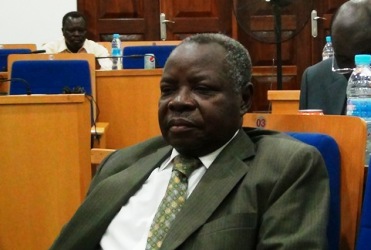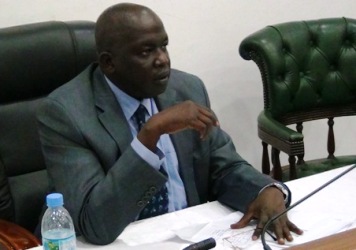S. Sudan MPs quiz finance officials over auditor’s report
August 8, 2012 (JUBA) – A tense atmosphere engulfed South Sudan’s National Legislative Assembly (NLA) on Wednesday as officials from the Finance and National Economy Ministry were thoroughly quizzed by Public Accounts Committee (PAC) members over the financial irregularities discovered by the 2007/2008 Auditor General’s reports.

The officials, led by the Finance Minister, Kosti Manibe were, for the first time, responding to several queries by members of parliament who are member of the PAC regarding shocking revelations in the two audit reports.
South Sudan’s Auditor General, Steven Wondu, in last month’s presentation before the NLA, largely attributed gross financial mismanagement in 2007 and 2008 on the Finance Ministry’s failure to comply with Financial Accounting and Procedures Ordinance (FAPO) adopted by the country.
The audit report, also found no evidence that the county’s Finance Ministry based release of funds to spending agencies on approved budget lines, as mandated by the Appropriations Act promulgated by South Sudan’s parliament and signed into law by the country’s President, Salva Kiir, in 2007.
Corruption is won of the biggest internal problems facing the year-old country, which is one of the poorest in the world. An estimated US$4 billion has been lost since South Sudan began self-rule as part of a 2005 peace deal with Khartoum, which led to independence just over a year ago.
“Respect for the integrity of the budget remained a worrying challenge,” the report reads in part, adding that, “While some institutions were cash starved, others received, on the discretion of the Ministry, more funds than were legally authorized.”
According to Wondu, the audit documents, which mainly covered nine specific areas, were conducted in accordance with International Organization of Supreme Audit Institutions (INTOSAI) standards, which involved examining, on a test basis, evidence supporting the amounts and disclosures in the financial statements as well as assessing the accounting principles used and significant estimates made by management, among others.
However, when asked why his ministry did not comply with the FAPO during the preparation of government financial statements in the 2007 fiscal year, the Finance Minister said the ministry was unable to access it and that by then, the Public Financial Management and Accountability Act has not yet been developed.
“In the absence of that, MoFEP [Ministry of Finance and Economic Planning] used International Public Sector Accounting Standards (IPSAS) on a modified cash basis of accounting, except where stated,” a confident Manibe told PAC members, chaired by Kom Kom Geng.
Under the modified cash basis of accounting, he explained, transactions and other events are reportedly recognized only when cash is actually received and actual payment made, while in the accrual basis, expenses incurred and revenue earned during the accounting period are reportedly recorded regardless of the actual receipt of cash.
“The modified cash basis comprises the cash basis of accounting supplemented with additional disclosure items,” the minister said, while making reference to pages 27 of the two reports.
Asked to explain why some institutions were cash starved, yet others received, on the discretion of the MoFEP, more funds than were legally authorized, the minister bluntly placed the blame on agencies, which declined to requests for operations money as required.
LAWMAKERS REACT
Awut Deng Acuil, a member of PAC tasked officials from the Finance ministry to explain the circumstances under which US$3 million was given to Mamsco Construction Company to construct a fire proof green composite construction company, yet no proper contract agreement was made.

“Was this money disbursed and if so, when and what terms were involved in the agreement between this company and the Finance Ministry?” she asked.
The Finance Minister, in his response, told MPs that the loan to given to Mamsco was given, allegedly on the directive of the President, after the company reportedly wrote a one-page document “pleading” for assistance.
“Yes, the money was disbursed, no contract agreement, the disbursement was based on the strength of the letter of H.E the President,” he told visibly shocked lawmakers.
“Since there was no contract where the pay-back period was supposed to have been stipulated, there was no loan repayment schedule, and as such MoFEP to date has not done anything to recover this loan. However, we still think that they must pay back the loan in question,” he added.
President Kiir wrote to 75 top officials in May asking them to return stolen funds anonymously to a special bank account in Nairobi, Kenya. In the 3 May letter Kiir said that leading members of South Sudan’s ruling party – the SPLM – had forgotten what they fought for in over two decades of civil war once they came into office after the 2005 peace agreement.
Also raised by lawmakers to the Finance Ministry officials was another issue involving the transfer of over US$7 million to the Geneva-based BNP Paribas Bank, by an unknown official, further raising doubts as to whether this money will be recovered.
Ministry of Finance officials also failed to give convincing answers on the criteria used in single sourcing of contracts, which according to the Auditor General, contributed to massive loss of tax payers’ money. The ministry, the audit report says, did not follow laid down procedures, contrary to existing financial laws.
The Minister, however, said single sourcing only applied to contracts that involved emergencies, citing procurement of security-related items.
Meanwhile, the PAC chairperson has requested the Finance Ministry to further avail documents, in support of some of the statements made before the assembly, at later date not specified.
No official has been arrested or tried in South Sudan for corruption despite the eye-watering amounts that have gone missing in the last seven years. The most controversial instance is the ‘Dura Scandal’ in which money supposed to be spend on building grain stores and stockpiling the vital food resource to prepare for food shortages.
The UN estimate that around half of South Sudan’s 8 million population may be food insecure in 2012 due to insecurity, low agricultural productivity compared to the country’s vast arable land, lack of infrastructure and investment in agriculture, and poor rains in some areas.
(ST)
